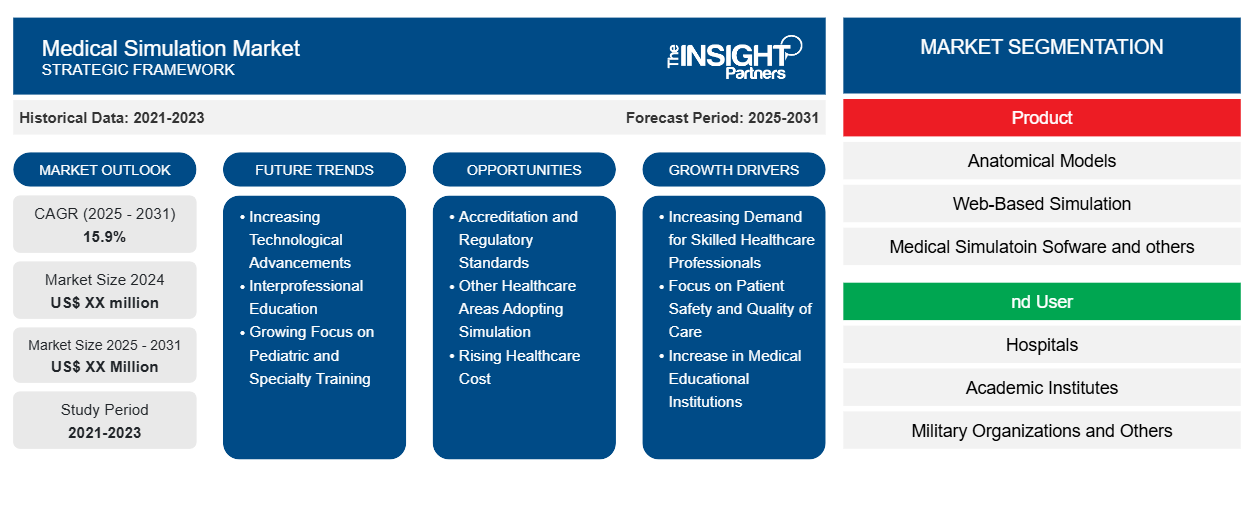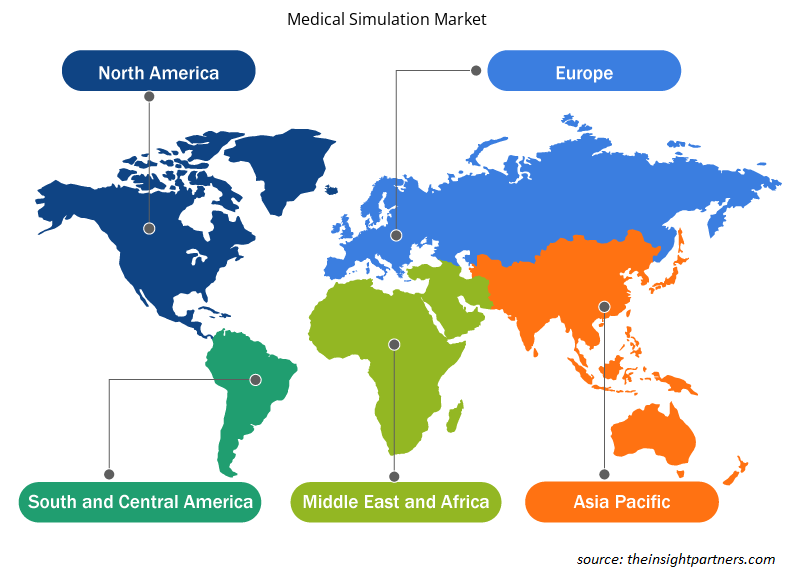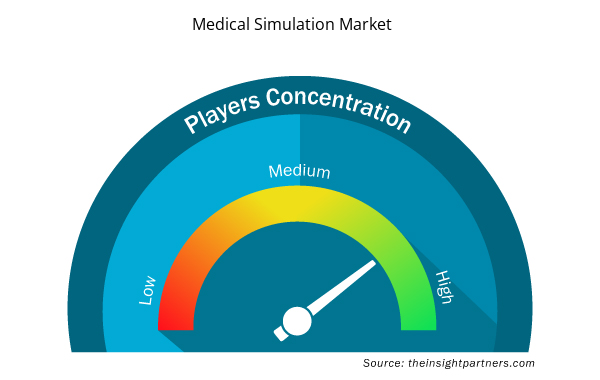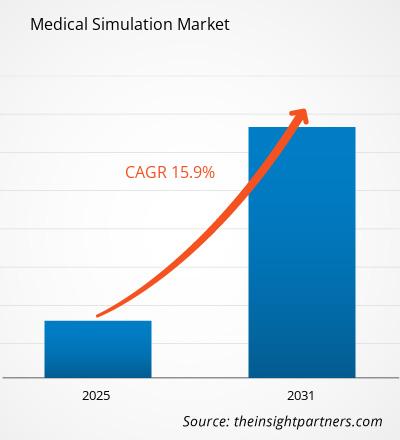The Medical Simulation Market is expected to register a CAGR of 15.9% from 2025 to 2031, with a market size expanding from US$ XX million in 2024 to US$ XX Million by 2031.
The report is segmented By Product (Anatomical Models, Web-Based Simulation, Medical Simulatoin Sofware and others), End User (Hospitals, Academic Institutes, Military Organizations and Others). The global analysis is further broken-down at regional level and major countries. The Report Offers the Value in USD for the above analysis and segments.
Purpose of the Report
The report Medical Simulation Market by The Insight Partners aims to describe the present landscape and future growth, top driving factors, challenges, and opportunities. This will provide insights to various business stakeholders, such as:
- Technology Providers/Manufacturers: To understand the evolving market dynamics and know the potential growth opportunities, enabling them to make informed strategic decisions.
- Investors: To conduct a comprehensive trend analysis regarding the market growth rate, market financial projections, and opportunities that exist across the value chain.
- Regulatory bodies: To regulate policies and police activities in the market with the aim of minimizing abuse, preserving investor trust and confidence, and upholding the integrity and stability of the market.
Medical Simulation Market Segmentation
Product
- Anatomical Models
- Web-Based Simulation
- Medical Simulatoin Sofware and others
nd User
- Hospitals
- Academic Institutes
- Military Organizations and Others
Customize This Report To Suit Your Requirement
You will get customization on any report - free of charge - including parts of this report, or country-level analysis, Excel Data pack, as well as avail great offers and discounts for start-ups & universities
Medical Simulation Market: Strategic Insights

- Get Top Key Market Trends of this report.This FREE sample will include data analysis, ranging from market trends to estimates and forecasts.
Medical Simulation Market Growth Drivers
- Increasing Demand for Skilled Healthcare Professionals: Health care sector is diversifying, and well-trained professionals are in greater demand in it. The simulation training allows the learners to gain experience in an unmatched manner. With the emergence of new technologies, treatments, and policies related to the care of patients, there is a rising demand for healthcare professionals to be adequately trained. Medical simulation technologies provide real time training environments where health care providers can go and develop their skills without risking patients life.
- Focus on Patient Safety and Quality of Care: Medical errors can be a root cause of serious hazards in hospitals. Simulation training enhances the skills of healthcare professionals, improves patient safety and care quality while reducing risks. Since better patient safety and quality care are of significant importance nowadays, medical institutions have started to rely more and more on simulation-based training so their staff would be perfectly skilled to perform procedures. It results in better-informed healthcare professionals along with a measurable decline in medical errors.
- Increase in Medical Educational Institutions: In more and more medical schools and nursing courses, the demand to educate students with proper training tools is becoming necessary. The simulation technology enables institutions to train their students effectively. In addition, there has been acceptance of the shift from the didactic mode of learning to competency-based education that focuses on hands-on experience and realism. To fulfill this requirement, medical simulators have emerged as effective tools for such learning.
Medical Simulation Market Future Trends
- Increasing Technological Advancements: The increase in using technology in providing educational sessions leaves much room for the advancement of simulation technologies, such as high-fidelity mannequins, virtual reality (VR), augmented reality (AR), and even gamification. This will allow these training sessions to appear more real and engaging to the learners. Medical education institutes are also making the most of new technology in developing their curriculum, thus bringing the latest tools and experiences to their students.
- Interprofessional Education: Healthcare is progressing very fast toward interprofessional education whereby learners from different healthcare professions undergo training together. Simulation-based training enables teamwork and communication among providers; that is, they advance interprofessional collaboration. At the workplace, simulation-based training will eliminate the barriers that exist between professions, thus facilitating effective communication and teamwork.
- Growing Focus on Pediatric and Specialty Training: The demand for simulation training in pediatric care and in specialized areas of medicine is as strong today; the increasing awareness of specific healthcare needs for children also contributes to this trend. This has nurtured a demand for training programs focused on pediatric-specific medical skills since the same diagnosis that may seem pretty bland in adults may be completely a different issue when appearing in children and, thus, requires different approaches to care.
Medical Simulation Market Opportunities
- Accreditation and Regulatory Standards: Many bodies accredit healthcare institutions to accept simulation-based training conducted as part of residency and continuing professional development, so many medical education institutions embrace the use of simulator technology. In addition, most healthcare education systems are competency-based; hence, several curriculum adopted for teaching incorporate simulation to meet accreditation standards, creating a need for simulation solutions at educational institutions.
- Other Healthcare Areas Adopting Simulation: Simulation is going beyond the medical training area. It has also been applied in other areas, such as surgical training, emergency response, and interprofessional education that would extend the market reach. This allows hands-on procedural as well as cognitive skills in a realistic environment and has no risk to patients or staff in the different specialty areas.
- Rising Healthcare Cost: Healthcare training programs by companies must be economic and not require expensive resources such as live patients or other methods of expensive training, which can include cadavers. Not only does this cut down on costs in the training itself, but also increases chances of more regular training sessions. Simulation can eliminate the cost of on-the-job training and improve performance in general.
Medical Simulation Market Regional Insights
The regional trends and factors influencing the Medical Simulation Market throughout the forecast period have been thoroughly explained by the analysts at Insight Partners. This section also discusses Medical Simulation Market segments and geography across North America, Europe, Asia Pacific, Middle East and Africa, and South and Central America.

- Get the Regional Specific Data for Medical Simulation Market
Medical Simulation Market Report Scope
| Report Attribute | Details |
|---|---|
| Market size in 2024 | US$ XX million |
| Market Size by 2031 | US$ XX Million |
| Global CAGR (2025 - 2031) | 15.9% |
| Historical Data | 2021-2023 |
| Forecast period | 2025-2031 |
| Segments Covered |
By Product
|
| Regions and Countries Covered | North America
|
| Market leaders and key company profiles |
Medical Simulation Market Players Density: Understanding Its Impact on Business Dynamics
The Medical Simulation Market market is growing rapidly, driven by increasing end-user demand due to factors such as evolving consumer preferences, technological advancements, and greater awareness of the product's benefits. As demand rises, businesses are expanding their offerings, innovating to meet consumer needs, and capitalizing on emerging trends, which further fuels market growth.
Market players density refers to the distribution of firms or companies operating within a particular market or industry. It indicates how many competitors (market players) are present in a given market space relative to its size or total market value.
Major Companies operating in the Medical Simulation Market are:
- Kyoto Kagaku Co., Ltd.
- Gaumard Scientific
- Laerdal Medical.
- 3D Systems, Inc.
- CAE
Disclaimer: The companies listed above are not ranked in any particular order.

- Get the Medical Simulation Market top key players overview
Key Selling Points
- Comprehensive Coverage: The report comprehensively covers the analysis of products, services, types, and end users of the Medical Simulation Market, providing a holistic landscape.
- Expert Analysis: The report is compiled based on the in-depth understanding of industry experts and analysts.
- Up-to-date Information: The report assures business relevance due to its coverage of recent information and data trends.
- Customization Options: This report can be customized to cater to specific client requirements and suit the business strategies aptly.
The research report on the Medical Simulation Market can, therefore, help spearhead the trail of decoding and understanding the industry scenario and growth prospects. Although there can be a few valid concerns, the overall benefits of this report tend to outweigh the disadvantages.
- Historical Analysis (2 Years), Base Year, Forecast (7 Years) with CAGR
- PEST and SWOT Analysis
- Market Size Value / Volume - Global, Regional, Country
- Industry and Competitive Landscape
- Excel Dataset


- Nuclear Waste Management System Market
- Formwork System Market
- Hot Melt Adhesives Market
- Europe Industrial Chillers Market
- Grant Management Software Market
- Quantitative Structure-Activity Relationship (QSAR) Market
- UV Curing System Market
- GNSS Chip Market
- Airline Ancillary Services Market
- Virtual Production Market

Report Coverage
Revenue forecast, Company Analysis, Industry landscape, Growth factors, and Trends

Segment Covered
This text is related
to segments covered.

Regional Scope
North America, Europe, Asia Pacific, Middle East & Africa, South & Central America

Country Scope
This text is related
to country scope.
Frequently Asked Questions
Kyoto Kagaku Co Ltd, Gaumard Scientific, Laerdal Medical, 3D Systems Inc, CAE, Mentice AB, Simulaids, Medaphor, Limbs Things are the some of the key market players operating in the medical simulation market
The market is expected to grow at a CAGR of 15.9%
Increasing demand for skilled healthcare professionals and focus on patient safety and quality of care are the major factors boosting the medical simulation market growth
Asia Pacific is estimated to grow at the highest CAGR over the forecast year (2023 - 2031)
The North America region accounts for highest revenue share medical simulation market
The final report will duly include market size and projection estimates for all the segments from 2021 to 2031, along with a revenue share and compound annual growth rate (%) for the regional/country-wise market wherein 2021-2022 are the historic years, 2023 is considered to be the base year, and the forecast will be provided till 2031, along with CAGR (%)
Trends and growth analysis reports related to Life Sciences : READ MORE..
1. Kyoto Kagaku Co., Ltd.
2. Gaumard Scientific
3. Laerdal Medical.
4. 3D Systems, Inc.
5. CAE
6. Mentice AB
7. Simulaids
8. Medaphor
9. Limbs & Things
10. Simulab Corporation

 Get Free Sample For
Get Free Sample For